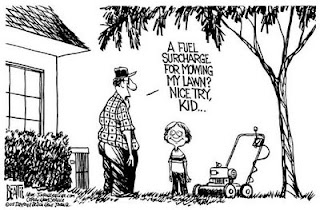 In discussions over the minimum wage often high schoolers will be offered as a rebuttal. In this post, I’m not going to argue what our laws should be in regards to minimum wages. Instead, I’m going to focus on the philosophical foundations.
In discussions over the minimum wage often high schoolers will be offered as a rebuttal. In this post, I’m not going to argue what our laws should be in regards to minimum wages. Instead, I’m going to focus on the philosophical foundations.
 For most people, there is no difficulty in saying that the kid who mows your lawn shouldn’t be entitled to $14/hour. This is extended to the kid in high school working a summer job, and it is finally and typically extended to the kid working a summer job in college. One of two arguments is typically offered.
For most people, there is no difficulty in saying that the kid who mows your lawn shouldn’t be entitled to $14/hour. This is extended to the kid in high school working a summer job, and it is finally and typically extended to the kid working a summer job in college. One of two arguments is typically offered.
The first argument is that the person doesn’t really offer a service of value for that wage. The various factors include maturity and technical acumen. It is argued that the whole point they are in school is so that they can get a decent job. No one supposedly grows up to want to be a burger flipper for life; I say supposedly because there are plenty of people who grow up to want to be chefs. I think this argument is the weakest because in real life we meet 40-year-old cashiers at Wal-Mart. We meet plenty of people well past the age of youth in jobs we would consider menial. Additionally, even if we don’t define the job as menial, at what point do we consider the person to have achieved maturity? It is quite a slippery slope, and while slippery slopes shouldn’t stop us from pursuing an endeavor, we should be taken to pause when we see folks routinely sliding down them.
The second argument is that we are dealing with a different class of people. While never put in such explicit terms, the argument is that we are paying the householder for use of a member of his household, and we therefore are partially relieving his obligation by paying one of his members. In short, by paying Little Mikey to mow our lawn we are relieving Mikey’s dad of the burden of providing for some of Mikey’s needs. If Mikey’s dad has no use for his son’s services, then we are doing Mikey’s dad a favor by giving him something useful to do. This argument largely parallels other classes in history.
Take for example women employees. I was reading a book on the Great Depression, and it had a picture of a group of women in protest. They were holding a sign that read, “Fire Married Woman. Hire Single Women.” Be it teachers, housekeepers, or nurses (broadly defined as women’s work), the old expectation was that these fields were not intended to be work that a family could be supported upon. If your daughter brought home a man claiming to be a one room school teacher, you would have looked at her askance and wondered what she was thinking. Two of these fields have undergone professionalization so that in most cases they are indeed family supporting jobs. Today you will often see laments over why the Church doesn’t pay their school teachers a living wage. (This is becoming more of a fiction in many areas due to competition with the public sector and private academies.) The simple answer is that is was never intended to be a job where one could make a living wage.
Another example of class differences is of course slavery. The slaveholder would certainly not set a rate ensuring the slave could put a little aside if he were frugal. The slaveholder as the head of household was under the obligation to make provision for the health and well being of his slave. When he slave was idle, any remuneration he could receive by offering his services to a neighbor was a net benefit to the slaveholder, because he was on the hook for health-care, providing in old age, and the everyday costs anyway.
Maybe in the end our best solution is to define high schoolers as a different class. I’m interested in others’ opinions on the matter. My own feelings on the matter are that this perpetuates the infantilizing of our ‘children’. At 14 or 16, I’m not all that convinced that we should be encouraging kids to spend their time working at McDonalds. I think it builds bad habits. If $14/hr is an impediment to an employer wanting to hire a high schooler, I’m not convinced that is a bad thing. If it isn’t an impediment, I’m not convinced a high schooler dropping out is a bad thing.
The only thing I’m really convinced of is the social teaching that free men are entitled to a living wage that can support a family living frugally and allow them to put a portion aside. I don’t believe that there is a separate living wage for single people and couples with children. I believe that the living wage is the calculation involving the couple with children. If single folk make more than they should, I’m comfortable with what previous generations did: have a slight bit of a look of scorn at the old single person for not bothering to grow up or become a religious. That is all for another post however.
[I have made some minor grammatical edits.]












